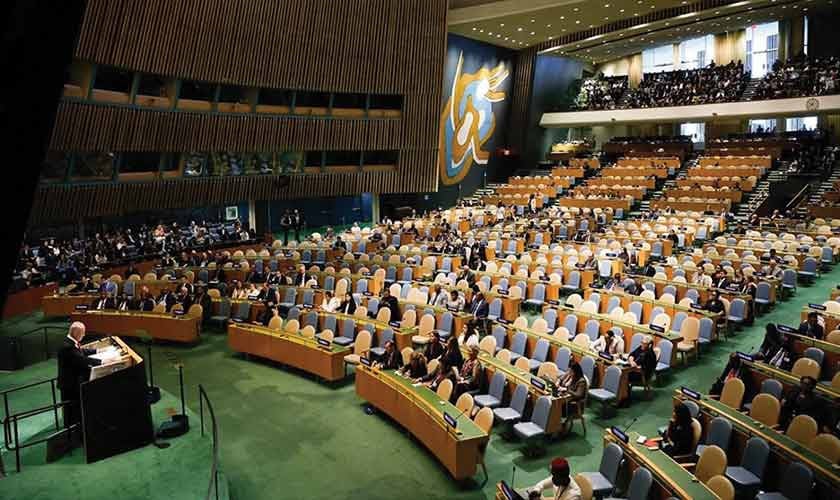The United Nations 80th General Assembly was expected to be a platform to discuss the future of peace in the age of artificial intelligence. Unfortunately, it turned out to be one of the most divisive sessions in recent memory, dominated by the issue of Palestine rather than Israel.
The gathering underscored that Palestine cannot be dismissed as a mere idea, even with the backing of a world power. Few member states were eager to listen to Israeli Prime Minister Benjamin Netanyahu during his speech at the United Nations General Assembly in New York on September 26, especially not Hamas — the enemy he has been obsessed with over the past two years.
Despite a boycott of his speech, Netanyahu tried to address Hamas directly. Western media reported that only dozens boycotted, yet Netanyahu spoke to an almost empty General Assembly hall after diplomats from Arab and Muslim countries, along with several African and some European nations, walked out in protest.
During his address, the Israeli leader claimed that Israeli intelligence had hacked cell phones across Gaza and used them to broadcast his speech. However, his message offered nothing new to the world or Hamas, merely demanding, for the umpteenth time, the immediate release of the remaining hostages.
Israel positions itself as one of the world’s biggest technological powers concerning military capabilities, fully backed by an even mightier United States. We have seen some of their military gadgets — like exploding pagers — used in conflicts. Yet, despite this formidable military muscle and technical superiority, Israel has failed to secure the release of the remaining hostages.
How can Israel achieve the more ambitious goal of eliminating Hamas? Of the 48 hostages still held in Gaza, Netanyahu says about 20 may remain alive. Although Israel’s focus for two years has been on a 41-kilometre stretch of land, backed by high-tech drones and well-armed ground forces, they have been unable to secure the hostages’ freedom.
Netanyahu vowed he would not rest until all hostages have been brought home. During his speech, a large white badge displaying a QR code was pinned to his lapel. He encouraged attendees to scan the code, which led to a website detailing the Hamas attacks on October 7, 2023. This was an attempt to promote the perception that he remains fixated on the goal he set nearly 730 days ago.
However, the world remains confused about Netanyahu’s ultimate objectives: Is he focused on finishing Hamas, targeting all Palestinians, or creating Greater Israel?
The New York session was marked by further political theatre. According to Netanyahu’s office, a public diplomacy campaign was launched in New York City, featuring billboards and trucks with messages like “Remember October 7” displayed in Times Square and near the UN building.
Meanwhile, a Pew Research Center report from April 2025 revealed that American support for Israel has dropped significantly since the Gaza war began. Despite the political posturing, Netanyahu appeared more isolated than ever on the world stage. His rigid policies have alienated some of his former allies, and a growing number of Western countries are now recognizing Palestinian statehood.
Countries such as the United Kingdom, Canada, Australia, Portugal, and France have made this belated decision — much to Netanyahu’s displeasure.
A few weeks before Netanyahu’s speech, on September 12, a vote took place in the UN General Assembly. Out of 193 member states, 142 voted in favor of a declaration calling for the peaceful settlement of the Palestinian question and the implementation of a two-state solution with Israel, amid resounding applause.
This “New York Declaration” was the result of an international conference held in July at UN Headquarters, organized by France and Saudi Arabia. Ten nations, including Israel and the United States, opposed the declaration. The other countries opposing were Argentina, Hungary, Micronesia, Nauru, Palau, Papua New Guinea, Paraguay, and Tonga. Twelve nations abstained.
These results highlight how limited Tel Aviv’s support has become.
Netanyahu’s dwindling backing is not only on the international diplomatic front but also reflects a fundamental shift in American public opinion. According to the April 2025 Pew report, only 54 percent of Americans now consider the Israeli-Palestinian war relevant to them — an 11-point drop from 65 percent in January 2024. Additionally, those who believe the conflict is significant to U.S. national interests have declined from 75 percent to 66 percent during the same period.
The United States, Israel’s staunchest ally, is showing signs of fatigue. Former President Donald Trump had declared that any attempt by Israel to annex parts of the West Bank would be a “red line” for him.
Despite these clear signals, Netanyahu has failed to grasp the message Western nations intended to convey with the recognition of Palestinian statehood: that “enough is enough.” Israel cannot have a perpetual license to kill; there is a limit — and it has been crossed.
Netanyahu’s speech, filled with spin and allegations of anti-Semitism, fell on deaf ears. He now finds himself isolated. The sooner he realizes this, the better it will be for him and for world peace.
According to Gaza’s Health Ministry, since October 7, 2023, over 65,000 Palestinians have been killed. The pressing question remains: How much more killing is needed?
Perhaps the most alarming aspect of Netanyahu’s address was what it lacked — a clear roadmap toward peace.
For those who hope for world peace, this absence of a viable plan is deeply concerning.
https://www.thenews.com.pk/tns/detail/1348318-no-method-to-netanyahus-madness


